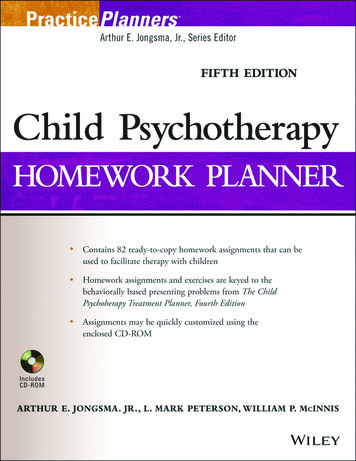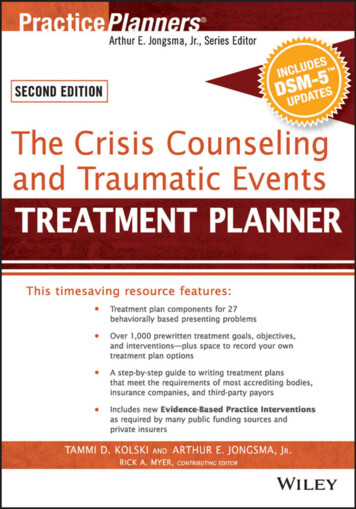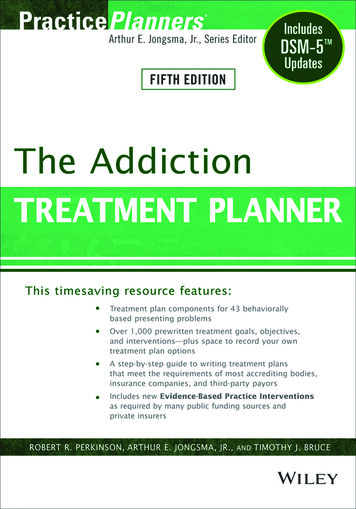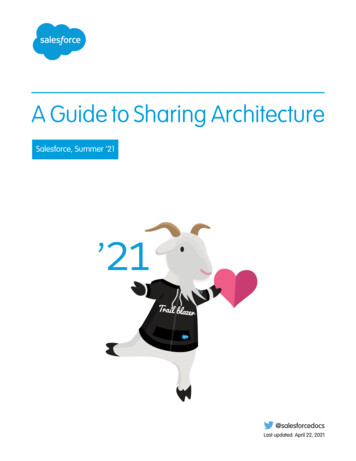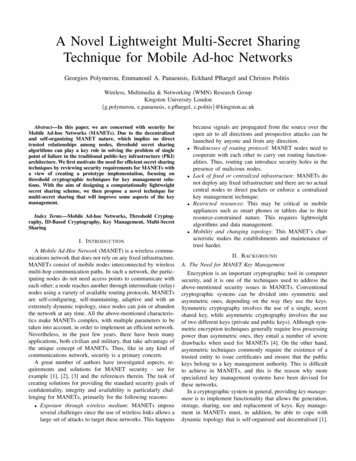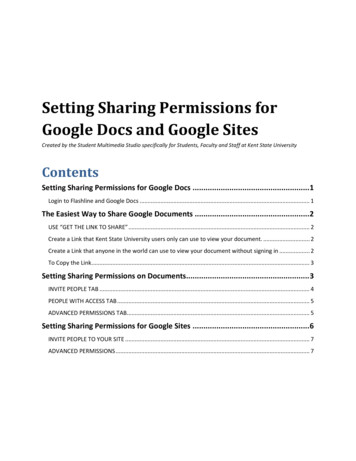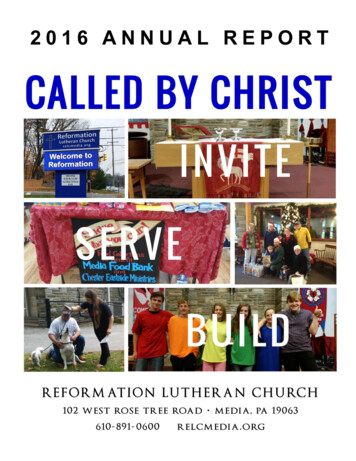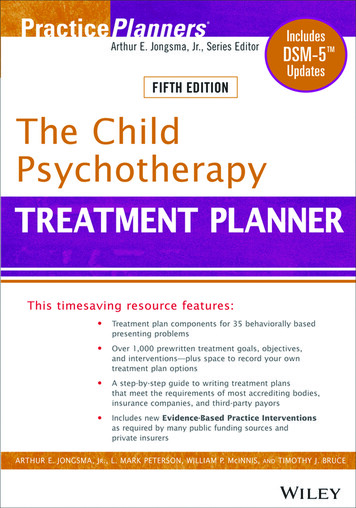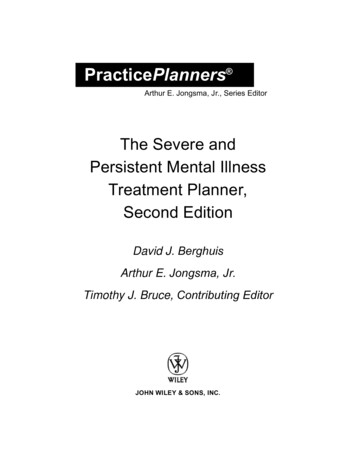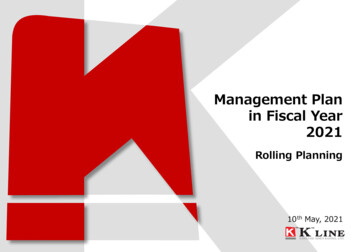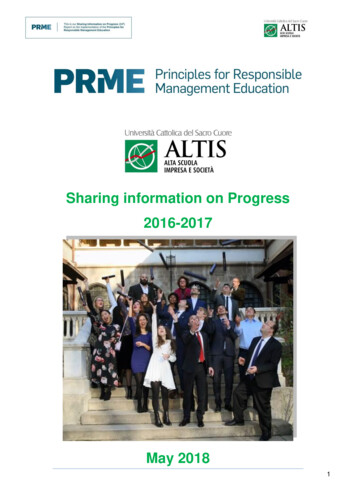
Transcription
Sharing information on Progress2016-2017May 20181
SHARING INFORMATION ON PROGRESS REPORTMay 2018Report Contents:Introduction from the Director :page 3Reporting on Principle 1:page 4Reporting on Principle 2:page 5Reporting on Principle 3:page 13Reporting on Principle 4:page 14Reporting on Principle 5:page 24Reporting on Principle 6:page 30The futurepage 352
ALTIS, the Graduate School Business & Society of the Università Cattolica del Sacro Cuore of Milan,Italy, is an international research and education center for the study and promotion of a responsible andcompetitive business culture.Founded in 2005, since October 2007 ALTIS is committed to advance the Global Compact’s principlesby means of forming new leaders well prepared and ready to adequately face the most pressing globalchallenges. In particular ALTIS’ endeavor is toward forming future leaders of the emerging markets.ALTIS has been member of PRME since 2008.http://www.unprme.org/index.phpMessage from ALTIS’ Director, Professor Vito MoramarcoALTIS is a young, constantly evolving and responsive body - a living entity.Its activities are all designed to encourage the emergence and growth ofEntrepreneurship and Impact Management for Sustainable Development.ALTIS is, and will continue to be, an Italian laboratory for the development of businesssolutions according to a win-win logic, a leading international centre of impactentrepreneurship and, finally, a bridge between advanced economies and thosewhich are rapidly developing. Consequently, the graduate school is committed toencouraging the international development of Italian companies, starting with SMEs inIndia, Latin America and Africa.In essence, the heart of the ALTIS vision is the desire to promote the dissemination of innovativeentrepreneurial options, which benefit both those who implement the process and theenvironment. Economic life is not necessarily a competitive zero-sum game, where there is inevitably awinner and a loser; it can be transformed into a cooperative positive-sum game, in which eachparticipant benefits from the actions of others.Over the past two years the Graduate school has been divided into four business units:Research, Education, Consultancy and E4 Impact (for Impact Entrepreneurship). The activity of thislast BU, designed to encourage the dissemination of entrepreneurial ideas and successful businessmodels with particular reference to the context of sub-Saharan Africa, has attracted the interest ofseveral Italian entrepreneurs and has led, in partnership with our university, to the creation of anindependent foundation, the E4impact foundation, which has retained the name of the original ALTISBusiness Unit.Developing Management and Entrepreneurship Impact for Sustainable Development is a “missionpossible”, an innovative and worthwhile challenge which can and must be taken on in Italy, despite beinga nation of contradictions, where difficulties and opportunities coexist – there are international disputesand opportunities, both public and private.Since November 1st, 2015, there has been a new Director of ALTIS who, along with all the staff,reaffirms the historical vocation of the graduate school - supporting students, businesses, non-profit andpublic sector organizations in a win-win cultural context; ultimately, fostering entrepreneurship andimpact management for sustainable development from the bottom up, by leveraging on individualsand their ideas.The directorVito MoramarcoApril 2018Full Professor of Economic PolicyUniversità Cattolica del Sacro Cuore3
Principle 1Purpose: We will develop the capabilities of students to be future generators of sustainablevalue for business and society at large and to work for an inclusive and sustainable globaleconomy.The first principle is fully embedded in ALTIS’ mission.Entrepreneurship and Management for Sustainable DevelopmentALTIS SUPPORTS PROFESSIONALS, MANAGERS AND ENTREPRENEURS WHO WANT TO BE PROTAGONISTS OFTHE CREATION OF A RESPONSIBLE MANAGERIAL CULTURE.WE FOSTER RESEARCH AND INNOVATION, WE DEVELOP EDUCATIONAL PROGRAMS AND WE OFFERCONSULTANCY SERVICES AIMED AT COPING WITH THE CHALLENGES OF A CONSCIOUS AND RESPONSIBLEDEVELOPMENT WITHIN THE CURRENT ECONOMIC CONTEXT, IN AN EFFECTIVE WAY AND WITH CONCRETETOOLS.The Graduate School aims to favour, through research, training and strategic consultancy tocompanies, private and public, the diffusion of a responsible managerial culture, the reconciliation ofcompetitiveness and corporate social responsibility, the interaction between profit and no-profit sector forthe development of the Country, the good governance and a sustainable internationalization. Integration of social and environmental responsibility (CSR) in the relevant business sector of anenterprise, as well as in its corporate governance and industrial plan; Management of no-profit enterprises; Partnerships among private, no-profit and public sectors for the creation of shared value; Internationalization of enterprises, with particular attention to the contribution it represents for thedevelopment of emerging and developing countries; Dissemination, at the international level, of the “industrial cluster” model, with particular attentionto geographical areas of specific interest for Italian enterprises and clusters such as, LatinAmerica, China, Eastern Europe, the Mediterranean Basin and the African continent.4
Principle 2Values: We will incorporate into our academic activities and curricula the values of globalsocial responsibility as portrayed in international initiatives such as the United Nations GlobalCompact.As described above, all ALTIS activities are guided and inspired by the concept of Corporate SocialResponsibility. This principle can be found in specific dedicated initiatives and formative activities (egMBA and Master programs, courses etc) but also as a general mindset inspiring all other initiatives andprograms that may apparently not be directly linked to the CSR issues. Below some examples.INTERNATIONAL MBATHE E4IMPACT FOUNDATION AND THE GLOBAL MBA IN IMPACT ENTREPRENEURSHIPE4impact (www.e4impact.org ) is an initiative launched in 2010 by ALTIS – Graduate School of Businessand Society of Università Cattolica del Sacro Cuore, with the objective of training impact entrepreneursin the developing world in order to support the start-up and growth of their businesses.In 2015, E4Impact became a Foundation with the support of Securfin, Mapei, Salini-Impregilo, UniversitàCattolica del Sacro Cuore and Always Africa Association. Later, Bracco, eni and Lisa Spa joinedE4Impact as Corporate Participants.The work of the Foundation contributes to the accomplishment of many of the United Nations 2030Sustainable Goals, including access to quality education, decent work, economic growth and povertyand hunger reduction.The main goals of the Foundation are: Train a new generation of entrepreneurs capable of combining economic success with positivesocial impact; Partner with local universities to embed entrepreneurial education in African ManagementCurricula; Facilitate the international development of European and African companies attentive to socialand environmental impactTo achieve its goals the Foundation, in collaboration with ALTIS - Università Cattolica del Sacro Cuore ofMilan and a local university from the host country, offers the Global MBA in Impact Entrepreneurship.The MBA is a unique executive program that guides active and aspiring entrepreneurs to start or scaletheir businesses, providing them simultaneously with an academic and business accelerationexperience.The Foundation also supports the expansion of African and International SMEs in the Sub-Saharan area.By matching them with reliable local entrepreneurs, E4Impact offers small businesses a low cost, lowrisk opportunity to enter the African countries where the MBA is offered.The MBA program guides active and aspiring entrepreneurs to start or scale their business, giving themsimultaneously an academic and business acceleration experience. It supports both active and aspiringentrepreneurs to: Develop the business skills necessary to guide a new venture or scale an existing business; Utilize tools and solutions for the start-up or scaling of a high growth business; Develop a personal network of mentors and investors; Establish links with entrepreneurs across Africa.5
The following elements make up the uniqueness of the MBA:a. For entrepreneurs only: The MBA admits only participants who have a business project. Theprogram is built around participants’ business ideas and each course is designed to help themconcretely build on that project.b. Coaching: Participants are supported by a Business Coach, a dedicated business consultant thatassists them in refining of their business idea, developing the business plan and establishing anindustry network.c. Relations with investors: Participants are given a minimum of three opportunities to pitch theirproject to a jury of investors.d. Dual degree: Together with the degree from the local university, the program offers an MBA from theCatholic University of Milan, Italy, Europe’s largest private university.e. International recognition: The MBA is the first non-American program to receive the AshokaInnovation Award; moreover in 2015 Mario Molteni, E4Impact CEO, was named Senior AshokaFellow.The 12-15 month-long MBA is planned to be have a blended formula, partly in presence and partlyonline, in order to meet the participants professional needs. The format allows students to directlyimplement the acquired information, thus responding to the Master’s motto:“We don’t teach entrepreneurship, we train entrepreneurs”.At the end of 2017 the MBA was active in:Kenya: 7th edition of the MBA in Nairobi at Tangaza University College“MBA Global Business and Sustainability”.Ghana: 4rd edition of the MBA in Accra at Catholic Institute of Business andTechnology – “Global MBA in Impact Entrepreneurship”Sierra Leone: 3nd edition of the MBA in Makeni at University of Makeni“Global MBA in Impact Entrepreneurship”6
Uganda: 3nd edition of the MBA in Kampala at Uganda Martyrs University“MBA Global business and Sustainability”Ivory Coast: 2nd edition of the MBA in Abidjan at Centre de Recherche et d’Actionpour la Paix - “MBA en Entrepreneuriat et Développement Durable”Senegal : 1st edition of the MBA in Dakar at Institut Superieur de Management “MBA en Entrepreneuriat”Ethiopia : 1st edition of the MBA in Addis Ababa at St. Mary’s University College “ Global MBA in Impact Entrepreneurship ”By the end of 2018 the MBA will start also in: Rwanda at Kigali Institute of Management122 entrepreneurs are currently under training, while 542 have been already trained.7
MBA student in Ethiopia during a coaching sessionMBA Champion Joseph Nkandu from Uganda processingcoffee (he’s founder and executive director of NUCAFE)MBA student in Sierra Leone at the endof the Business Plan CompetitionAwarding of the winner of the Business Plan Competition instKenya during the 1 Annual Entrepreneurship Conferenceorganized at Tangaza University College(University Partner in Nairobi)Contacts: E4Impact Foundation www.e4impact.org - info@e4impact.org -FacebookTwitterITALIAN MBAs and MASTERSThe curricula of our Master programs include courses related to the themes of social, environmentalresponsibility and ethics in business and how these themes can be included in the strategic developmentplan of a company.MASTER GLOBAL BUSINESS AND SUSTAINABILITY(GBS), MILAN (ITALY)To train young managers able to facilitate the internationalization of the Italian companies, both in theemerging and in the developing markets, giving at the same time new strengths, opportunities and ideas;to overcome the current economic uncertainty in an innovative manner; to contribute to the growth of theeconomic and productive framework of the students’ countries of origin. This done in the light ofsustainable development and responsible management and entrepreneurship.This is the scope of the Master Global Business and Sustainability a full time first level Master degree8
held in Milan ever since 2008. The Master consists of two different moments: the courses (9 months),structured in high profile modular terms (both online and in class), during which the students learn thelogics of the international management; an Action Project (3 months, consisting in an internship, a paperor a tutor-assisted business plan), in which the students can practice the know-how acquired during thecourses and the previous job’s experiences. In particular we highlight the following course in which theissues of sustainability, entrepreneurship and social entrepreneurship are analyzed specifically. Sustainability and new business opportunities. It is a 30 hrs course whose focus is on theways in which an increasing number of companies are attempting to address a range of socialand environmental challenges through developing practices for assuming social responsibility indoing business. In addition the course is aimed at presenting the strategic implication of CSR forbusiness activity within particular issues and areas of corporate responsibility.To do that, besides an introduction to the CSR topic, some lessons consider a specific corporateactivity and discuss the implications for and impacts on both companies and stakeholders.Moreover, students are provided with concrete examples (through cases and guest speakers) ofhow the above mentioned issues can be a driver for new business opportunities.MBA: EXECUTIVE MASTER IN BUSINESS ADMINISTRATION-(EMBA)The MBA is carried out in partnership with the Italian financial Editor “Il Sole 24 Ore”, it is an ExecutiveMBA for working managers. A CSR course module is scheduled in the program.ALTIS graduation offer includes also three master programs that are not strictly related to the instancesof sustainability but that, as mentioned above, carry the imprinting of the ALTIS values.EXECUTIVE MASTER FOR SMALL AND MEDIUM ENTERPRISES (PMI)Addressed to entrepreneurs of SMEs, the master provides skills and innovative competences to managegrowth and organizational/technological innovation processes, relationships with the financial communityand intergenerational transition with a sustainable approach.EXECUTIVE MASTER IN MANAGEMENT AND INNOVATION IN PUBLIC ADMINISTRATIONS (MIPA)The Master is meant to increase the managerial competences of public sector managers and officials. Itfocuses also on the theme of innovation of Public Administration and Public Social Responsibility.EXECUTIVE MASTER IN SOCIAL ENTREPRENEURSHIP (EMSE)Management training for non-profit cooperatives, associations and NGOs in collaboration with theHuman Foundation (http://www.humanfoundation.it/eng), a nonprofit organization that promotescollaboration to generate and implement innovative solutions for social problems.The Master responds to the needs of managerial training for those working in social enterprises, in nonprofit organizations, cooperatives, associations, NGOs in Italy and abroad. The course provides the skillsto manage business activities related to the social world, optimizing available resources and defininguseful methods to achieve socially responsible objectives.MASTER IN ACCOUTING AND AUDITING (MAA)The Master in Accounting and Auditing (MAA) responds to the demands of the labor market because ittransforms the graduate students into professionals, that is to say people with the technical knowledgeand practical approach necessary to start their professional career with the interlocutors of the highestlevel in the field of auditing and internal auditing, financial and managerial accounting. The path is highlyprofessional and job-oriented thanks to the "Lessons Stage" structure and the experience and thecompany know-how brought to the classroom by teachers, professionals, EY Partners and managers.This Master also includes a specific session on corporate responsibility and sustainability reporting.9
MASTER IN FINANCE: FINANCIAL INSTRUMENTS, MARKETS AND SUSTAINABILITY (MFIN)Our Master in Finance: tools, markets and sustainability, is the first in Italy in response to the request ofnew professionals able to evaluate the investments or economic and financial management ofcompanies and institutions. The aim is to train financial operators with a forward-looking look, who areable to take account of the principles of sustainability while maintaining a high level of attention toprofitability.ALTIS created this master by joining the 2030 Agenda, proposed by the United Nations, which indicatesto public and private companies and investors guidelines and parameters shared at international level,fundamental for aligning investment strategies to achieve the Global Development Goals (SDG) ) anddirect the financial system towards an inclusive and sustainable development model: the so-called SDGsfinance.Master students per year2017201610
Executive Courses:PROFESSIONE CSR (THE ROLE OF CRS MANAGER)We have been leaders in the dissemination of CSR in Italy since its early stages, through researchand forefront training programmes. We have contributed to define the role of the CSR manager,conducting the first international research on the new profession, back in 2005.In 2006 we created the CSR Manager Network, the national association that brings togetherprofessionals dedicated to the management of socio-environmental and sustainability issues linkedto company activities.Since 2006 we have developed a 84 hrs course per year, addressed to professionals that are involved inCSR and sustainability-related activities on a full or part-time basis, within enterprises, foundations,consultancy companies, Public Agencies, NGOs. The course (12th edition in 2016 and 13th and 14th in2017) analyzed both strategic aspects of the implementation of CSR, and specific topics, such as HRmanagement and employees benefits, marketing, supply chain, environment, community relations, socialreporting.332 CSR Managers have been trained in these 14 years.PROFESSIONE WELFARE (THE ROLE OF WELFARE MANAGER)A 42 hrs course per year is aimed at all professionals - working in public and private organizations, profitand non-profit organizations - interested in acquiring the skills necessary to implement a corporate andterritorial welfare plan.EXECUTIVE COURSES FOR THE NON-PROFIT SECTORDifferent executive courses are organized for professionals of the non-for-profit sector. Each has aspecific topic (management, project management, HR management, fund raising etc) and addressesspecific profiles.11
International Executive Courses:Programa Internacional para Desenvolvimento de Lideranças do Sistema SEBRAE –International Program for the SEBRAE System Leadership DevelopmentSince 2013 we have developed a collaboration with the Corporate University Sebrae (Support Servicefor micro and small enterprise- www.sebrae.com.br ) in Brazil for the preparation of a training project tooffer a high preparation level leaders of the Sebrae System. The program aims to provide the mosteffective tools for the implementation of Sebrae strategy in every Federal Unit and the management ofthe resources available, in order to ensure the support of the Sebrae business, even in the face ofcontinuous changes in marketing and macroeconomic scenario.In these three years we have organized courses for 230 managers and directors of the Sebrae about themanagement of small and medium enterprises, giving particular focus on Italian excellence in innovationand sustainability fields. In 2015 inside our course we organized a visit in EXPO, and there they couldparticipated at the seminar "The contribution of companies and universities for sustainability in Europeand in Italy: comparing experiences."12
Principle 3Method: We will create educational frameworks, materials, processes and environments thatenable effective learning experiences for responsible leadership.Starting from the explicit mission of the MBA Programs (in Italy or abroad), the aim of creating anenvironment that may facilitate the formation of responsible leaders can be found in: Environment: MBA classes are highly international and promote a truly multicultural experience.In the past five editions of the Master in Global Business and Sustainability-Milan students from50 different nations have attended classes.The multicultural experience of ALTIS permeates all courses and research activities and thevalues of social responsibility and sustainable development are present in every initiative of heSchool as part of its mission. Materials: besides the courses dedicated to socially and environmentally responsible managers,the general recommendations given to Faculty members is to choose among materials, casesetc. related to sustainable management, even in courses that may appear distant from thespecific main topic. Internships: students are exposed to opportunities and networked with players andprofessionals that act in the area of CSR, Social Entrepreneurship, Environment are invited toconsider choosing their internship in this field. Initiatives: Students attending MBAs or other masters or executive courses are invited toparticipate in the initiatives that ALTIS organizes in the responsible management field.As an example, already three of our Alumni have been awarded in the Global Social VentureCompetition and have been funded for their initiatives.ALTIS promotes moreover meetings and conventions that are focused on the issues of SocialImpact and CSR and offers specific consultancy on Sustainability Report and CSR policies thatare often the subject of specific research papers. Attitude: Specifically for the entrepreneurship-oriented masters and courses, the choice of ALTISis to offer formats (blended in presence-online) that enable attendants to immediately apply theskills and competences acquired in class, thus allowing them to keep their business running andto implement enhancements straight away.13
Principle 4Research: We will engage in conceptual and empirical research that advances ourunderstanding about the role, dynamics, and impact of corporations in the creation ofsustainable social, environmental and economic value. learning experiences for responsibleleadership.Our research approachOur multi-level approach: looking at the big picture with a detailed oriented attitudeSince our establishment, in ALTIS we conduct scientific research and action research activities on thethemes of sustainability.With scientific research activities we develop new knowledge and produce generalizable resultsthat can be applied to different realities, thus contributing to the international academic debate.With action research activities, on the other hand, we investigate processes and offer concretesolutions to favour the integration of sustainability in the strategies, governance and daily activities ofspecific companies and institutions.In order to be at the forefront of research and offer the best expertise to our interlocutors, we work with apool of international researchers and academics and, drawing on the prestigious network of theUniversità Cattolica, we develop strategic partnerships with influential research centres such as, theCass Business School, the Boston College, the Doughty Centre for Corporate Responsibility, and theCranfield University.Sustainability at the core.Research is the engine that ignites all the activities conducted in ALTIS.In fact, research represents a remarkable added value for the participants of our courses and masterswho benefit from the access to the most innovative theories and concrete examples offered by theprojects developed by our researchers.In addition, in ALTIS research and consultancy activities targeted to companies are closely linked. Withthe scientific rigour and the pragmatic approach of our research, we support entrepreneurs andmanagers who wish to pursue growth and cultural change in their companies, that being public or private,by offering consultancy services, which favour competitiveness, innovation and the development of newsustainability-based business models.Our research team, PhDs, researchers, associate and full professors conduct a continuous activity andpublish in the most referenced national and international reviews.The researcher team is counts on PhDs, researchers and associate and full professors.Professors Mario MolteniMatteo Pedrini14
Researchers Benedetto CannatelliLaura Maria FerriPhD candidates and research fellows Giacomo CiambottiChiara De BernardiAlisa SydowMaria Cristina ZacconeMarco MinciulloFollowing a list of main publications in 2016 and 2017 :PublicationAbstractBramanti, V. Coeli, A., Ferri, L. M., Fiorentini, G. &Ricciuti, E. (2017). A model for analyzing non-profitorganisations in the food recovery, management andredistribution chain. In Baglioni, S., Calò, F., Garrone, P& Molteni, M. (ed). “Foodsaving in Europe. At thecrossroad of social innovation”, Palgrave Mcmillan,Cham (CH). ISBN: 978-3-319-56554-5 o 978-3-31956555-2 (ebook); DOI: 10.1007/978-3-319-56555-2The chapter analyses the food recovery,management and redistribution system fromthe viewpoint of food charities, and it presentsa model to analyse the contraints faced byNPOs as well as the enablers which helpthem manage surplus food more efficiently.The model is built combining the literature onboth non-profit oganisations and foodrecovery management with the empiricalevidence from 37 cases of NPOs across fourEuropean countries (France, Germany, Italyand Spain). For each dimension of the model,the cross-case analysis carried out hereallowed to identify strengths and weaknessesof the NPOs along the three stages of thefood recovery process: collection,management and distributionCannatelli B. (2016). Exploring the Contingencies ofScaling Social Impact: A Replication and Extension ofthe SCALERS Model. VOLUNTAS, p. N/A, ISSN: 09578765, doi: 10.1007/s11266-016-9789-xWhile the scaling of impact remains to be oneof the most important issues in the field ofsocial entrepreneurship, limited empiricalresearch has been focused on the topic. Oneof the first scholarly attempts to build aresearch agenda to better understand thescaling of social impact was the SCALERSmodel. Building on initial theoretical andempirical work, this study is based on asample of 179 nonprofit organizations in Italy.It also extends prior work by providingtheoretical grounding through contingencytheory and conducting the first empirical testof the situational contingencies of theSCALERS model. A positive relationshipbetween each of the SCALERS variables andscaling—except replicating—has been found.Initial evidence of five contingencies thatmoderate the relationship between the15
PublicationAbstractSCALERS and scaling of social impact hasalso been found.Cannatelli B., Pedrini M., Grumo M., (2017), “The effect ofbrand management and product quality on firm performance:the Italian Craft Brewing Sector”, Journal of Food ProductsMarketing, Vol. 27, No. 3, 303-325 [ISSN: 1045-4446;DOI:10.1080/10454446.2014.949989].The article contributes to the limited literatureon marketing strategies of microfirmsoperating in new niches within matureindustries. The study explores the effect ofbrand management processes and productquality on performance of microfirms in theItalian brewing industry. Preliminary qualitativeinterviews with eight entrepreneurs wererealized. Then 92 questionnaires werecollected from the entire population of 335microbreweries operating in Italy forquantitative analysis. Findings suggestintrinsic product quality being the mostrelevant determinants of firms’ performance,while the adoption of brand managementprocesses exerts a significant, negativeimpact. The article takes into account therelationship between brand management,quality, and performance by focusing on asingle industry. Future research may enhancethe significance of our findings by includingmultiple sectors. Entrepreneurs andmicrobusiness leaders should carefully assessboth external (industry life-cycle stage) andinternal (resource availability) factors beforeengaging in any brand management activity.In mature firms, it may be more beneficial andeffective focusing on enhancing productquality. The article addresses an importantgap regarding the adoption of brandmanagement practices in microfirms, addingto the emerging strategic marketing literaturein the small business field.Cannatelli B., Smith B., Giudici A., Jones J., Conger M.(2016). An Expanded Model of Distributed Leadershipin Organizational Knowledge Creation. LONG RANGEPLANNING, vol. 2016, p. 1-21, ISSN: 0024-6301, doi:10.1016/j.lrp.2016.10.002Based on a three-year qualitative, longitudinalcase study of a social venture partnership, weextend the understanding of distributedleadership in organizational knowledgecreation. We develop an expanded model ofdistributed leadership that identifies theantecedents, different forms, and enablers ofdistributed leadership in knowledge creation.Our findings move beyond a static andmonolithic understanding of distributedleadership to illustrate how an expandedmodel informs the situational leadershipframework and spiral of knowledge creationacross an organization's hierarchy andboundary in the context of social16
PublicationAbstractentrepreneurship.Cannatelli, B.L., Smith, B.R. & Sydow, A. J Bus Ethics(2017). https://doi.org/10.1007/s10551-017-3482-xThis work extends theory aboutentrepreneurship across formal and informalinstitutional boundaries. While research hasidentified formal, informal, and renegadeeconomies, we introduce the concept of thecontroversial economy, defined as the set oflegal but illegitimate (to some large groups)activities through which actors exploitopportunities. We explain the existence of thecontroversial economy, its prevalence, andprovide examples. We explore how and whyentrepreneurs may exploit opportunities in thecontroversial
Ivory Coast: 2nd edition of the MBA in Abidjan at Centre de Recherche et d'Action pour la Paix - "MBA en Entrepreneuriat et Développement Durable" Senegal : 1st edition of the MBA in Dakar at Institut Superieur de Management - "MBA en Entrepreneuriat" Ethiopia : 1st edition of the MBA in Addis Ababa at St. Mary's University College -

